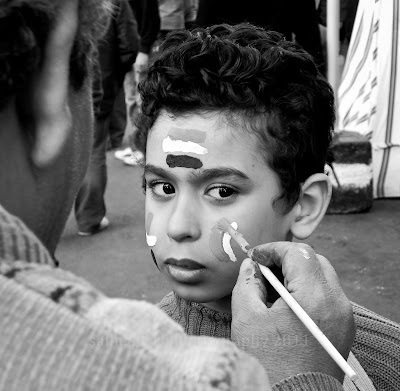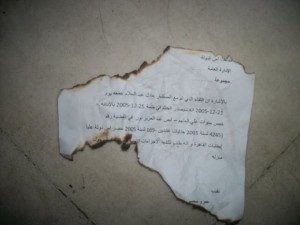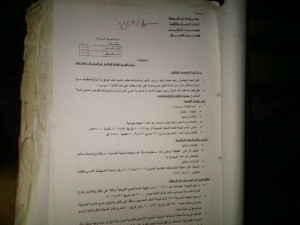Today Egyptians voted ‘yes’ or ‘no’ on proposed amendments to the Egyptian constitution. It is the first vote held since the resignation of Egypt’s former president, Hosni Mubarak, in February, after nearly thirty years of rule.
The amendments were drafted by a committee appointed by Egypt’s ruling Supreme Council of the Armed Forces (SCAF) last month. Among other things, the amendments ease the requirements for presidential candidacy, require judicial supervision of elections, and require that Emergency Law be approved by the people if it is to be in effect longer than 6 months.
Polls opened at 8am across Egypt, and within hours turnout was unprecedented. By 9am, over 1,000 people were qued outside a polling station in Cairo’s Zamalek neighborhood, and there were similar scenes at many other polling stations. Some voters reported waiting in line for as long as five hours to cast their ballots.
One report said so many people had come to vote at the Faculty of Engineering polling station in Cairo that new ballot boxes had to be brought in because the first ones were filled. So many voters turned out in Upper Egypt that the Egyptian military flew more judges in to observe.
Despite the wait, millions of Egyptians were willing to stand in line for the chance to cast a ballot in what many feel will be the first vote where their ballot will actually be counted, and where the outcome is not a foregone conclusion. Egyptians young and old took pictures of their inked fingers to share with friends or post on their Facebook profiles.
While the vast majority of Egyptians were willing to wait in long lines to cast their ballots, Cairo’s governor, Abdel Azim Wazeer, was kicked out of a polling station by voters for not waiting his turn. In contrast, Twitter was buzzing this morning over Prime Minister Essam Sharaf’s refusal to cut in line. Instead, the Prime Minister waited in line with the people for his turn to cast his ballot.
As voting drew to a close, reports of irregularities and violations throughout the day continued to surface.
The most common irregularities in Cairo regarded the indelible ink and official stamps on ballots. Voters are required to dip their fingers in a bottle of ink which is supposed to stain their fingers for an extended period of time. It was particularly important today, as voters were allowed to vote with their national ID cards at the nearest polling station rather than with voting cards at a specific station.
While some Egyptians reported the ink was indeed permanent, others confirmed it washed off easily or wore off throughout the course of normal activity.
The second main complaint was that some ballots were missing the required official stamp, and voters worried those ballots would not be counted. However, a statement by the Supreme Judicial Committee in charge of supervising the referendum guaranteed the validity of the unstamped ballots so long as the signature of the supervising judge was present.
El-Sayyid el-Badawi, president of the liberal Al-Wafd Party, said the religious trends in Egypt abused the vote of the poor by telling them if they did not vote ‘yes,’ Article 2 of the Egyptian constitution will be canceled. Article 2 defines Egypt as an Islamic state and cites Islamic Sharia law as a source of legislation.
The Egyptian coalition for election supervision said the Muslim Brotherhood, generally considered Egypt’s largest and best organized opposition group, has used the slogan ‘Yes with Allah’ to convince its followers to vote yes.
In the city of Suez, mosques were used earlier in the day by Salafists to tell people they must vote ‘yes’ if they want to protect Sharia law. Also in Suez sources said there were many basic violations inside polling stations, including excessive presence of army personnel inside the polling stations and no curtains or voter privacy.
The campaigning has happened despite a statement from SCAF saying that any such campaigning was forbidden.
The Brotherhood is the only significant force outside the former ruling regime that called for a ‘yes’ vote in today’s referendum.
Despite its support of the amendments, however, the Brotherhood’s General Guide, Muhammad Badie, said the brotherhood will accept the outcome of the referendum whatever it is because it is the will of the Egyptian people and they are the real source of power.
Youm7 has learned that some polling stations have witnessed separate queues for Muslims and Christians, something not seen before in Egyptian polls. Separate queues - or even polling stations - for men and women are common.
According to reports, Human Rights lawyer Rajia Omran was arrested while monitoring polls in Bab el-Khalk after being asked to leave despite having a permit to monitor. Further details have not been made available.
Prominent Egyptian opposition figure and former head of the UN’s IAEA Mohamed ElBaradei was attacked by a mob throwing stones this afternoon as he went to vote in the Cairo neighborhood of Moqattam. According to reports, ElBaradei was met with chants of “we don’t want you” by people opposed to his presidential candidacy.
ElBaradei stated on his Twitter account that he went to vote with his family and was attacked by organized thugs who smashed his car with rocks. He said holding a referendum in the absence of law and order is an irresponsible act.
It is the first major report of violence from Cairo. There was also a report of a clash between two groups of voters in Daqahlia. The Egyptian Health Ministry said it has not received any reports of injuries related to today’s vote.
The lack of violence is significant: during November’s parliamentary elections, violence was widespread and three people died in Cairo alone.
Social media was once again an important tool for activists during today’s referendum. Egyptians discussed their experiences, shared which polling places were relatively empty and which had hours-long lines, and reported possible voting irregularities.
Despite the reports of violations, today’s vote saw far fewer irregularities and violations than are typical of Egyptian polls, in addition to seeing unprecedented voter turnout across Egypt. Many Egyptians are hopeful that the vote will be legitimate.
There were reports earlier in the day that polling stations would remain open past the originally scheduled closing time of 7pm due to high voter turnout, but it appears that polling stations were closed on time.
The past week saw intense debate over the amendments, but the vast majority of Egyptians will likely accept the results of the referendum, whatever they may be. Today, Egyptians had their first taste of democracy.
As one young Egyptian said on the social networking site Twitter, "Today Egyptians have demonstrated that they are ready for democracy, but the system is the one lagging far behind."







